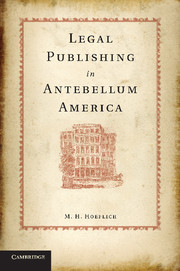Book contents
- Frontmatter
- Contents
- Preface
- Bibliographical Note
- Introduction
- 1 A Bookish Profession
- 2 Birth of the Law Book Trade
- 3 Spreading the Word: Catalogues and Cultivation
- 4 Bidding for Law Books
- 5 Risk, Subscriptions, and Status
- 6 John Livingston, Esq.: Law Bookseller as Cultural Entrepreneur
- 7 Conclusion: Selling the Law in Antebellum America
- Index
- References
5 - Risk, Subscriptions, and Status
Published online by Cambridge University Press: 04 August 2010
- Frontmatter
- Contents
- Preface
- Bibliographical Note
- Introduction
- 1 A Bookish Profession
- 2 Birth of the Law Book Trade
- 3 Spreading the Word: Catalogues and Cultivation
- 4 Bidding for Law Books
- 5 Risk, Subscriptions, and Status
- 6 John Livingston, Esq.: Law Bookseller as Cultural Entrepreneur
- 7 Conclusion: Selling the Law in Antebellum America
- Index
- References
Summary
Law book selling, book publishing, and book binding, as discussed in previous chapters, were often all performed by the same individuals or small publishing consortia in the period from 1770 to 1830. Most printers and law booksellers lacked the substantial capital to undertake expensive publishing projects without some form of subsidy, unless the book was assured sales because of either an author's reputation in the Bar or the importance of the subject of a new book. Until the introduction and widespread use of stereotyping in the second quarter of the nineteenth century, a technique that created economies of scale by freeing up expensive lead type, the risk of producing books without an assured market was high. Unusual volumes, or those with limited markets, were unlikely to be published or distributed by normal trade methods.
Law books posed a particularly risky form of book publishing and selling precisely because they were, for the most part, only going to be bought by lawyers. Legislative printing was probably the least risky, because it generally carried an exclusive copyright in one printer or printers' group and often also had guaranteed sales. But legal treatises had no such advantages. Unless the treatise was of a general nature – such as Blackstone's Commentaries, which were widely purchased by nonlawyers, and the many quasi-legal texts designed for farmers, businessmen, or others who might have need of legal sources – treatises generally could only be expected to sell to lawyers.
- Type
- Chapter
- Information
- Legal Publishing in Antebellum America , pp. 125 - 144Publisher: Cambridge University PressPrint publication year: 2010



